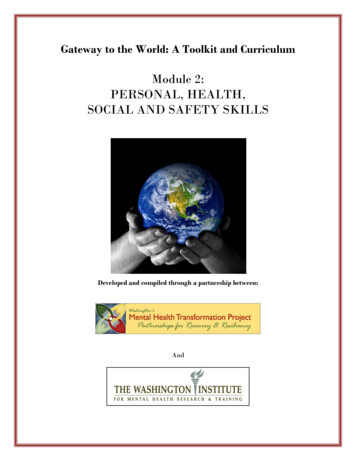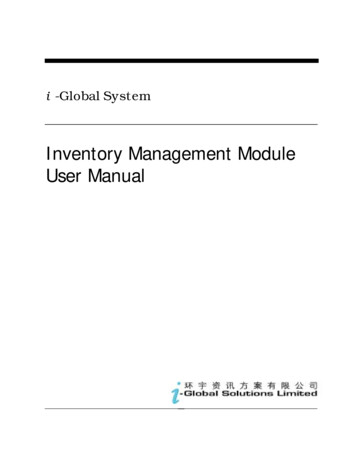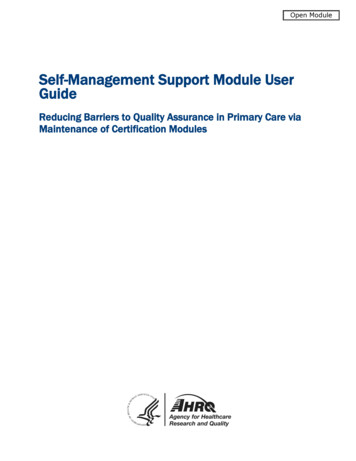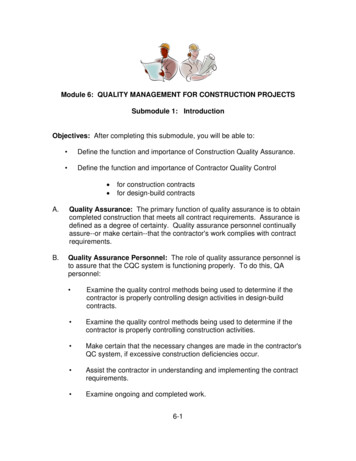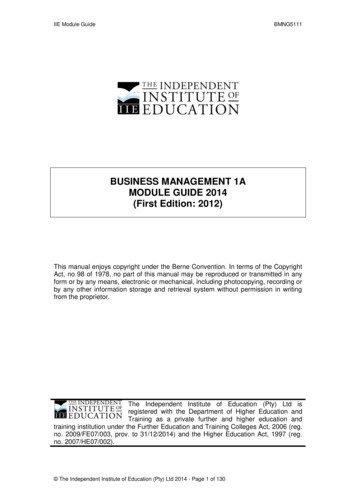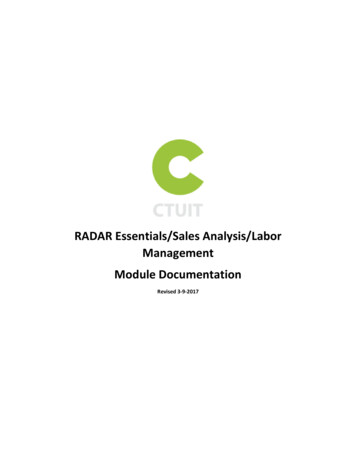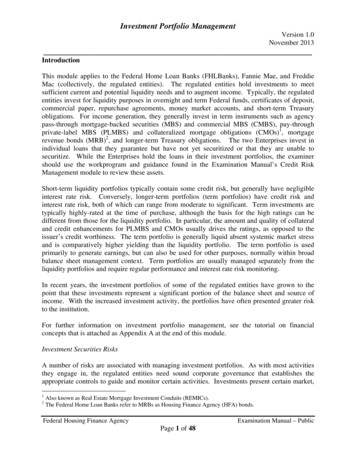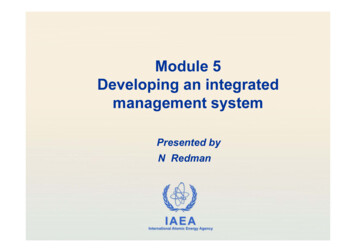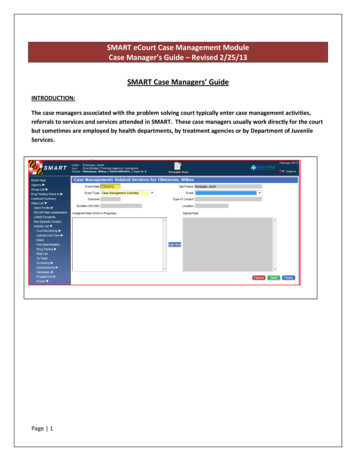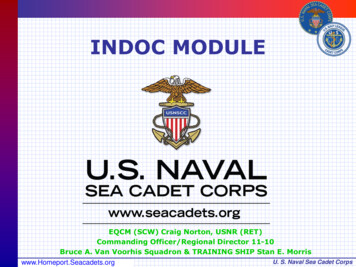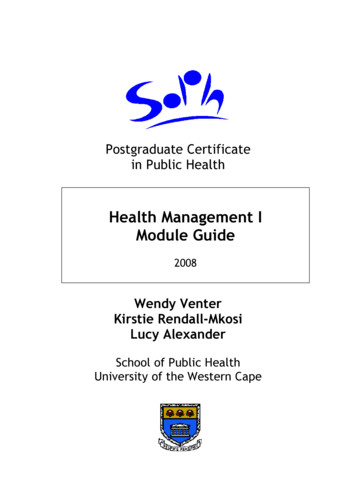
Transcription
Postgraduate Certificatein Public HealthHealth Management IModule Guide2008Wendy VenterKirstie Rendall-MkosiLucy AlexanderSchool of Public HealthUniversity of the Western Cape
Postgraduate Certificate in Public Health – Health Management I by WendyVenter, Kirstie Rendall-Mkosi, Lucy Alexander, School of Public HealthUniversity of the Western Cape, is licensed under a Creative CommonsAttribution-NonCommercial-ShareAlike 2.5 South Africa License.Module Registration Number: 881538Value of module: 20 creditsStudy time required: 200 notional learning hoursPre-requisites: None except those in the Rules of AdmissionQualification serviced by this Module:Postgraduate Certificate in Public HealthStudy Materials for this module:Module Guide & One Reader
HEALTH MANAGEMENT ISchool of Public HealthUniversity of the Western CapePrivate Bag X17Bellville7535E-mail: jkader@uwc.ac.zaFax: 27 21 959 2872Tel: 27 21 959 2591 or 9592809Copyright SOPH School of Public Health, UWC, 2002All rights reserved. Except for the inclusion of brief quotations in a review, nopart of this publication may be reproduced, stored in a retrieval system, ortransmitted in any form by any means, electronic, mechanical, photocopying,recording or otherwise, without the written permission of the SOPH, UWC.First published 2002Printing and binding: PrintwizeVision Statement – The School of Public Health, University of the WesternCapeThe vision of the School of Public Health at the University of the WesternCape is to build the capacity of public health workers to transform the healthsector from a predominantly curative, hospital-based service to a highquality, comprehensive, community-based, participatory and equitablesystem.
MultiWorksDesign& layout: Cheryl OntongCONTENTSI MODULE INTRODUCTIONPage1Letter of Welcome12Information about this module33Assessment6II STUDY SESSIONSPageUnit 1The Manager18Unit 2Managing People49Unit 3Leading People76Unit 4Planning107Unit 5Managing Resources171Module Conclusion235
I MODULE INTRODUCTION1School of Public HealthUniversity of the Western CapePrivate Bag X17Bellville7535South AfricaDear colleagueWelcome to the Health Management I module.This module was created to help prepare individuals in the fields of health andwelfare for the challenging role of manager. We hope that you will find thematerials relevant to your work situation and useful in developing your skills as amanager.About the ModuleHealth management is considered an important skill area for Public Healthprofessionals. This Health Management module thus forms one of the core modulesof the Postgraduate Certificate in Public Health. The module covers three keymanagement areas: people management, planning and resource management.Through exploring these areas, the module aims to provide information andassistance at a practical level, continually referring the student to managementissues within their own context. As management is cross-cutting in relation toother Public Health fields, the student is also expected to relate much of themanagement study material to the contexts of the other Certificate modules.This module is designed for self-study or flexible learning which enables you towork through the study sessions at your own pace. This also allows you to explorethe material to whatever depth you prefer, and to skip parts with which you arealready familiar. The module invites a range of learning activities including reading,analysis, reflection and application of new concepts, theories and models to yourown work context as well as observation and practice.Finding your way around the Module IntroductionThe introductory pages which follow provide you with an overview of the Module, itsoutcomes, assignments as well as the sources from which you can expect supportand assistance. Take the time to look through this section before you beginstudying – taking particular note of the assignments and their requirements.SOPH, UWC - Postgraduate Certificate in Public Health – Health Management I1
Contact informationAll the contact information that you may need is contained in section 4 of theintroduction. You will find a Student Details Update Form in your SOPH ProgrammeHandbook. If your contact details have changed in any way, please send it to theStudent Administrator, School of Public Health straight away.AssessmentThis module will be assessed through two assignments. Check the due dates withthe schedule from the Student Administrator. The assignments will test yourunderstanding of the study materials and your ability to apply this understanding toa work situation.Student evaluationWe hope that you will give us some feedback on your experience of these studysessions as this is the first time we have presented them. Your feedback will bevaluable to us in improving them. You will be asked to fill in an evaluation formwhich you will find on the site.We hope you enjoy your studies.Best wishes,Module ConvenorVision Statement – The School of Public Health,University of the Western CapeThe Vision of the School of Public Health is to contribute to the optimal health ofpopulations living in a healthy and sustainable environment in developing countries,particularly Africa, with access to an appropriate, high quality, comprehensive andequitable health system, based on a human rights approach.SOPH, UWC - Postgraduate Certificate in Public Health – Health Management I2
2INFORMATION ABOUT THIS MODULE2.1AcknowledgementsThe writers acknowledge the contribution of the following individuals:Dr Arthur Heywood of the SOPH, who authored the previous version of thismodule, the management section of Management for Health Promotion,Revised Version, August 2001.Prof David Sanders and Prof Uta Lehmann of the SOPH, who reviewedsections of this module.2.2Module aims and rationaleThis module was developed in recognition of the fact that health and welfareprogrammes often fail to perform optimally, not because of technicalincompetence, but rather as a result inadequate management expertise. Healthcare workers are frequently required to carry significant managementresponsibilities with little or no preparation for the role of manager. The modulethus aims to provide students with an understanding of the concepts behind andpractices associated with effective management in the field of health. Theapproach is practical, requiring students to relate information to their owncontext and reflect on their own experiences as they work through the module.Three main areas are covered: people management, planning and resourcemanagement. Each of these areas is in itself a vast study area, well beyond thescope of this module, but we have attempted to provide insights into some ofthe key aspects. In keeping with the three management areas covered, themodule emphasises three vital management themes: the importance of people,the importance of planning and the importance of systems.The over-arching theme of the module is captured by the statement:Management is: getting things done through people.The crux of this definition is that effective management requires focus on boththe people doing the work as well as on the work itself.Thus, in the initial units of the module, you focus on gaining an understanding ofyourself, your job and the people you work with: what makes people behave theway they do, what motivates them to work well, and what results in frustration.We look at how to manage episodes of conflict constructively and how to leadyour team to optimal performance.Next we turn our attention to planning as an integral part of management. Herewe follow the theme: Planning is using information from the past and thepresent to prepare for the future. Management without planning is impossible.SOPH, UWC - Postgraduate Certificate in Public Health – Health Management I3
Three issues underlie the need for planning: activities need to be thoughtthrough in detail, decisions need to be made in the face of scarce resourcesand external influences need to be anticipated. A thorough planning processaddresses these issues and becomes an important management tool to helpyou in understanding your context, making sound decisions and in maintainingcontrol of your responsibilities.The final broad area we explore is that of resource management. This is closelyrelated to planning. The emphasis here is on the importance of systems toprovide clarity in terms of organisation and responsibilities and to ensureoptimal use of resources. The establishment and maintenance of well-managedsystems links back to issues within leadership, motivation and team work, thusreiterating our theme: Management is: getting things done through people.2.3Module outlineThis module consists of 5 Units divided into a total of 17 Study Sessions. Mostof the Study Sessions require you to read one or two texts from the Reader.You will be referred to them in the course of the Study Session. In addition, youare expected to work through the Tasks which are integrated across the StudySessions. Sessions vary in length and could take between one and four hoursto complete. The Units in this Module are as follows:HEALTH MANAGEMENT IUnit 1 – The ManagerStudy Session 1Study Session 2What is Management?Managing YourselfUnit 2 – Managing PeopleStudy Session 1Study Session 2Understanding PeopleManaging ConflictUnit 3 – Leading PeopleStudy Session 1Study Session 2Study Session 3MotivationLeadershipBuilding TeamsUnit 4 - PlanningStudy Session 1Study Session 2Study Session 3Study Session 4Study Session 5The District Health SystemPlanning: What and Why?The Planning CyclePlanning a ProjectInformation for Planning and ManagementUnit 5 – Managing ResourcesStudy Session 1Developing and Interpreting BudgetsStudy Session 2Managing DrugsStudy Session 3Managing Medical Supplies and EquipmentStudy Session 4Managing TransportStudy Session 5Managing PersonnelSOPH, UWC - Postgraduate Certificate in Public Health – Health Management I4
2.4Learning outcomesThe module is intended to lead to the following outcomes:Intended Health Management outcomesBy the end of this module, you are expected to be able to:!!!!!!!!!!!!!!!!!!!Identify your own management roles.Manage yourself in order to manage others better, through improvedstress management, time management and delegation.Demonstrate recognition that people’s differences will affect the way theybehave at work.Practise empathic listening.Apply conflict management concepts and models to your work situation.Describe factors which influence people’s motivation to work.Describe the theories of leadership and the concept of fitting theleadership approach to the situation.Describe the manager’s role in leading a team through its stages ofdevelopment.Describe the District Health System and the rationale underpinning it.Define planning and discuss reasons for planning, including scarcity ofresources and the influence of external factors.Describe the stages of the planning cycle and define key planning terms.Draw up a plan for a small scale project using a planning tool.Describe the role of health information systems in planning andmanagement.Demonstrate a basic understanding of how to develop and interpretbudgets.Summarise the concepts of essential drugs and standard treatmentguidelines, and inventory control.Describe the concept of appropriate technology and the value ofstandardisation and maintenance in relation to medical equipment.Describe the components of a transport management system.Describe and the components of a personnel management system.Evaluate components of a variety of systems.Intended academic outcomesBy the end of this module, you are expected to be able to:Define, explain and apply a range of concepts, models and theoriesrelevant to the field of health management.! Collect, select information and analyse information from the field ofhealth management.! Summarise information using diagrams and interpret diagrams.! Select, analyse and apply information from academic and proceduraltexts.! Evaluate health management practices and systems in terms ofcriteria.!SOPH, UWC - Postgraduate Certificate in Public Health – Health Management I5
3ASSESSMENT3.5Assignment for Health Management IAssignment 1 focuses on people management and Assignment 2 addressesplanning and resource management. You are required to submit the assignmenton the due date with the Module Evaluation Form (at the back of this Guide).Assignment 1 – Managing a Conflict Situation (40% of module result)Analyse a situation of conflict and propose solutions (1 500 words)Identify a recent situation of workplace conflict in which you were involved or ofwhich you were aware. Analyse the situation using the following guidelines:a)Briefly describe the setting in which you work (one paragraph).b)Summarise the main causes of the conflict, drawing on theterminology of the reading on conflict which you studied.c)Identify the roles within the jobs of the main individuals involved inthe conflict, demonstrating your understanding of the concept ofroles.d)Analyse other factors underlying the behaviour of the individualsinvolved. Refer to the factors and the relevant theories behind thefactors affecting human behaviour in the workplace, e.g. RoleTheory, needs, motivation, and causes and responses to conflictsituations.e)Describe how you, as a manager, would lead the process ofresolving this conflict. Explain the reasons for using the approachyou choose, referring to the texts on leadership, conflictmanagement and, if relevant, team building.Please note: Two thirds of your assignment should focus on sections (d) and(e). Look at how the marks have been weighted below.Assessment Criteria for Section 1(These criteria show you how you will be assessed)CriteriaMarksi)Clear and well-structured answers. (Refers to all sections)5ii)Comprehensive descriptions. (Refers to a, b and c)10SOPH, UWC - Postgraduate Certificate in Public Health – Health Management I6
iii)Use and application of
equitable health system, based on a human rights approach. SOPH, UWC - Postgraduate Certificate in Public Health – Health Management I 3 2 INFORMATION ABOUT THIS MODULE 2.1 Acknowledgements The writers acknowledge the contribution of the following individuals: Dr Arthur Heywood of the SOPH, who authored the previous version of this module, the management section of

